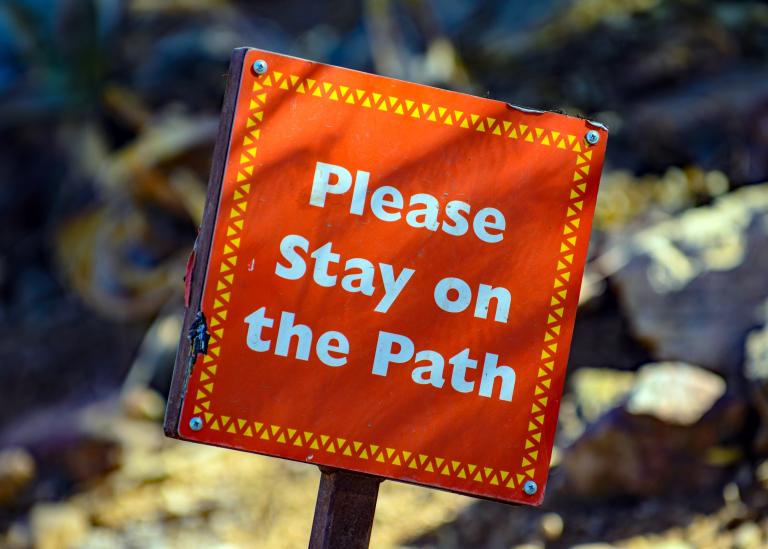
But he said to me, “My grace is sufficient for you, for my power is made perfect in weakness.” Therefore I will boast all the more gladly about my weaknesses, so that Christ’s power may rest on me. (2 Corinthians 12:9)
A common misconception is that the fear of commitment is a horrible attribute to take on as a part of your personality. But I disagree. I fear commitment. I have grown quite comfortable with admitting this. I have come to terms with the fact that it is part of my personality. I have tried countless times to override this part of me—to flip it on its head— to see if I can’t learn to find comfort with commitment. To no avail, it is difficult to let go of something that has been apart of who I am for so long.
It’s not that I am trying to rationalize my fears by making excuses for them. It’s not that I want to convince others that their attributive “weaknesses” shouldn’t be given considerations for challenge or resistance, either. But some of us try hard to overcome certain personality “flaws” and no matter how many approaches we take; we can’t fix it or change it. It just is who we are.
Fear of Commitment? Me?
So, why not surrender to it? Many of my approaches to challenges and oppositions have been best resolved by absolute surrender. Instead of seeing something in myself as a character deficit or a fatal flaw, or even a sinful nature that needs redemption; I often find that to obtain a peace within, I must just let go of worry over it. Surrender to it. Acquiesce to the nature of my authentic self. My authentic self doesn’t want to overly commit.
When I was in my early twenties, a therapist told me that he thought I had a fear of commitment. I found that almost laughable at the time. I assured him that I had no problem with commitment. In fact, I knew that I latched on too strongly to men in relationships. So strongly, and so overbearingly, that the harder and more forcibly that I loved them, the quicker they ran in the other direction. (Sound familiar?)
I dismissed the therapist’s summary of psychological analyzation and found a new therapist. Clearly, he had no idea what he was talking about. But that statement stuck with me over the years and it was only a decade later that I started to realize that he might have been right.
Lose Yourself
In retrospect, as I have learned more about unattachment, I came to realize that worrying about all the things that I thought (or others thought) were wrong with me proved to be just another form of attachment. The things we focus on that we believe we must change often become little obsessions and we can lose ourselves in them.
When we lose ourselves in our worry and anxiety, we end up creating a monster that we cannot control. For me, this monster that I created attempted to destroy everything that was going good in my life. Denying my true nature to be wary of commitment requests launched me into a downward spiral of demolition. I said yes to everything. I over-committed all my time and energy. I wanted to be available to every request. I did everything I could to show that I was not afraid of commitment nor challenges.
I had suppressed so much in my life that after my husband deployed to Iraq, everything came spurting out the top, like a pressure-cooker improperly sealed—the lid sputtered off into the air, and the monster was released.
Monster on a Wrecking Ball
The most egregious act by this monster was adultery. Nine months into my marriage, while my husband was across the Atlantic Ocean, I was too drunk to function and found myself in a situation I could have never imagined for myself. The consequences were more than tangible.
Fortunately, ten years later, my fear of commitment within my marriage is no longer an anxious concern. It took me many years, however, to come to terms with identifying this very present fear. It took much discussion to deduce the reason for my infidelity.
A personal liberation came when I was able to do so. For too long, I merely accepted that the reason I betrayed my husband was simply because I wanted sex and he wasn’t around to provide for that need. The reality was; however, I was embarking on a monumental shift in my entire belief system, and while I was breaking down all the walls, my wrecking ball smashed nearby buildings. There was collateral damage, and my husband suffered from the wreckage.
As we worked on rebuilding, we had to be honest about our anxieties and fears. We had to look deep within ourselves and ask ourselves what our fears said about us. That’s when I started to really question why I refused to believe that I had a fear of commitment.
Karma Chameleon
It’s not so much that I reject commitment. It’s that I don’t want to be confined to anything for too long— in case I change my mind. I have always been a chameleon. I never sat at the same lunch table in the cafeteria for too long, I didn’t stay put in circles of friends for too long. I changed my hair color with every season, and it was always a drastic change. From dark to light or light to dark; from tame to loud and back to tame again. I rebelled against conformity and continuity. Oddly, I depend on continuity more now than I ever did.
I know it drove people crazy. I hopped from clique to clique, I left job after job. I started businesses and then dropped them after a year or two. I went to college, dropped out, and then went back, but finally dropped out again. I moved a lot, too. All my life, I was moving to a new place. The evidence was always there, but I refused to see it for what it was.
Relationships never lasted for me. I rationalized it by reminding myself “nothing lasts forever.” But I have a great reverence for committed relationships—now. Even though I always pined after romantic relationships, the idea of sticking with one person for the rest of my life was quite overwhelming for me. What if I changed my mind?
I believe that one of the things my husband loves and hates most about me is that I change my mind. And is that not a woman’s prerogative? To change her mind as often as the wind blows or the sun sets?
Not a Fear, Not a Defect, Just My Nature
Nonetheless, the idea that because I am hesitant about commitment that it reveals something about my fears, is a notion I won’t accept any longer. It’s not just about what worries me, it’s about what it means to be me as well. Perhaps it could have symbolized fear and only fear in the past. But now, I believe it demonstrates my skepticism more than anything. And I surmise that skepticism is not such a weakness in a society that has technology capable of manipulating video and audio.
Surrender to attributes that are viewed as weaknesses seems to be the most beneficial approach for me. If I am aware that my nature is to raise an eyebrow and investigate, I can be conscious to how bias I tend to be.
In many cases, our character flaws merely need to be integrated into our authentic selves, not eradicated altogether. If we are made aware of our tendencies to push away, then we can be more intentional about opening our arms instead.
So, I chose to take my ‘fear of commitment” and turn it into a tool, instead of viewing it as a mark against me on the tally sheet of life. I will surrender to the “flaws” that others may claim to see in me, and dive beyond the surface reflection to discover how I can take that part of my personality and subvert it, integrate it, and use it as a tool to reveal a truer version of myself.
Our true natures are revealed in those pesky little quirks that make us who we are. If these traits are becoming a negative attribute in our lives, we can recognize it, and collaborate with it. Integrating the “shadow” sides of our personality can help us fully reveal our authentic selves, and more so, can help reveal the divine presence within.
How can you surrender to what you fear so that you can subvert it and make it your strength?












